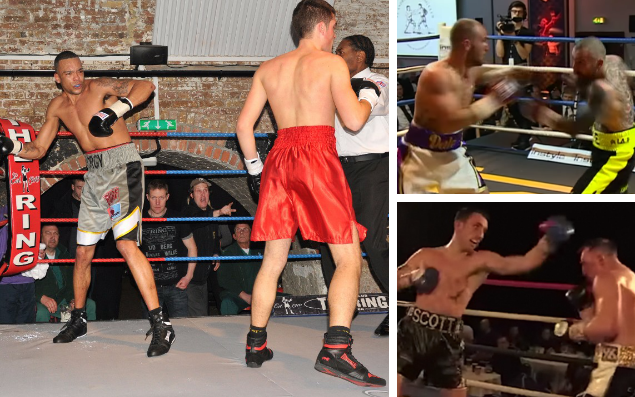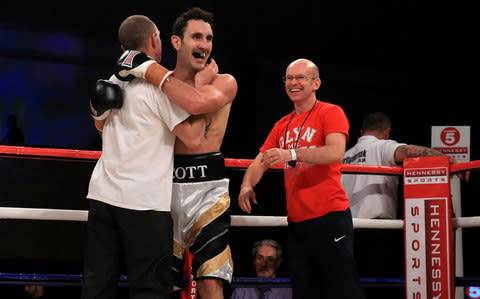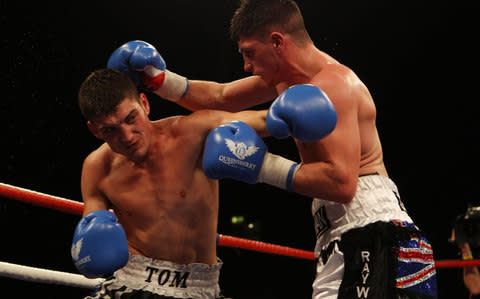Exclusive: Boxers who have seen fatality first hand plead for more help when tragedy strikes

The British Boxing Board of Control is under pressure to offer increased pastoral care and counselling for families and boxers affected by tragedies in the sport as the investigation into the death of Scott Westgarth continued on Tuesday.
The 31-year-old died on Sunday, hours after his points victory over Dec Spelman in an English light-heavyweight title eliminator in Doncaster. It was Westgarth’s 10th professional fight. Reports are still being compiled, but it is understood he felt unwell in his dressing-room after the fight, and was taken to the Royal Hallamshire Hospital, where he died.
The fatality is the third linked to boxing in five years in the UK, following the deaths of Michael Norgrove in 2013 and Mike Towell in 2016. Norgrove’s opponent in 2013 was Tom Bowen, who subsequently quit the sport after struggling to cope with the tragedy. On Tuesday night Bowen told The Daily Telegraph of his overwhelming sadness for the Westgarth family after the latest boxing tragedy, recalling how he struggled to cope with the feelings of “guilt” over the death of his opponent.
“I feel so sorry for what happened. This is a terrible tragedy for Scott’s family,” he said. “I’m sure more chaplaincy could be done because it’s a difficult time for a lot of people involved in events like this. At the time, I think I got one call from the Boxing Board, and I believe they could do more in these situations.”
Robert Smith, secretary of the BBBC, is conducting a full inquiry into Saturday’s events and said the board was open to looking at new ways of dealing with such tragedies.

Smith said contact had already been made with Westgarth’s family and with Spelman, his opponent, to offer help.
Asked if there was enough pastoral care in place, Smith said: “We do put calls in... and we have. But it’s a fine line. People may not agree, but everyone involved is very raw at the moment. Those involved often need space to grieve, and we want to respect the wishes of the family at these times.”
On his own tragic fight, Bowen noticed that Norgrove was blinking and backed off in the fifth round as the referee laid him down on to the canvas. When told that his opponent had subsequently died, Bowen’s grief was so great that he felt unable to resume his own boxing career. “I was due to fight a week later, but out of respect to Michael and his family, I felt it just wasn’t right. The more I thought about it, the less I wanted to go back,” said Bowen, whose father, Paul, like Westgarth’s father, John, was also a professional boxer.
Bowen’s previous fight, 10 days before fighting Norgrove, had been against Towell, who subsequently died in a bout with Welshman Dale Evans in Sept 2016.
“When that happened to Mike Towell, it did bring it all back,” said Bowen, who has been a full-time builder since quitting the sport. “Mike Towell had a young family, and I really felt it, and for them. I felt it when Nick Blackwell had his brain injury against Chris Eubank Junior. I think about Michael Norgrove a lot. I would really like to get in touch with his family.

“I didn’t feel sorry for myself – yes there is guilt, there is soul searching – but you feel bad for your opponent, and for his family. It’s not an easy thing to cope with, and I think I coped with it pretty well. Boxing was a big part of my life, and it just went.” Indeed, Welshman Evans retired last week, admitting he no longer felt able to box, having pledged to fight for a belt in the memory of Towell, who suffered a brain injury in the bout with him, after being knocked out in the fifth round. Towell died in hospital the following day. Evans said the “spark, the hunger and the determination” was not there any more. “Just worry and fear – I’ll openly admit.”
Evans told The Daily Telegraph on Tuesday night: “Some people might benefit from counselling, but I was able to get through it. There’s no doubt it’s a difficult time for everyone involved, and the weekend’s events did bring up all those feelings again.” The latest tragedy has renewed calls for the sport to be banned. Peter McCabe, chief executive of the brain injury charity Headway, called boxing “a senseless waste of life.”
However, Bowen did not believe a ban was the answer. “I am not against boxing in any way. It is a sport in which many thousands of lives are changed, and improved. It’s a force for good. I never had a street fight in my life. The ring, and the gym, is the place for young people to use their aggression, where it is supervised.”
Errol Johnson, Bowen’s coach, said on Tuesday that his charge “was badly affected” by the death of Norgrove and went “very distant after the tragic events”.

He added: “We have never spoken about how deeply it affected him in an emotional way, probably because he made the decision, the right decision, quite early that he really just didn’t want to carry on.”
Johnson reasoned that tragedies are often not talked about in boxing because of the inherent nature of the sport, admitting that he had been affected by the brain injury suffered in 2012 by one of his boxers, Jonjo Finnegan, who subsequently recovered. “Thankfully, Jonjo has come through it. I’ll never forget the seven hours when we were stuck at the hospital with him and it does affect you.”
The BBBC inquiry is bound to consider why there has been a rise in ring fatalities over the past five years when no fighters died in British rings in the preceding 18. Given that safety procedures have never been better, attention may be focused on whether there is a link to fighters being stronger, faster and fitter.
“We are waiting for all the reports to come in – from board officials at the show, the referee, the doctor’s reports – and we are in the process of gathering all the information which will be studied at the next board meeting in March,” said British Boxing chief Smith.
At a time when boxing is booming – there are 41 licensed boxing shows scheduled in the UK in March alone – Smith said that the board “is prepared to evolve to make boxing as safe as possible”.
He added: “We are always looking at ways of making it safer, but it is hard to see a way of making boxing 100 per cent safe.”

 Yahoo Sport
Yahoo Sport 





































